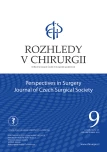-
Medical journals
- Career
Intrahepatic cholangiocarcinoma: risk factors affecting survival of operated patients
Authors: Z. Šubrt 1; M. Vošmik 2; A. Whitley 1; M. Oliverius 1; R. Gürlich 1
Authors‘ workplace: Chirurgická klinika 3. lékařské fakulty Univerzity Karlovy a Fakultní nemocnice Královské Vinohrady 1; Klinika onkologie a radioterapie Fakultní nemocnice Hradec Králové 2
Published in: Rozhl. Chir., 2022, roč. 101, č. 9, s. 443-451.
Category: Original articles
doi: https://doi.org/10.33699/PIS.2022.101.9.443–451Overview
Introduction: The aim of this study was to evaluate the results of surgical treatment of intrahepatic cholangiocarcinoma (IHCHCA) in terms of overall survival and disease-free survival, and to analyse and find potential prognostic factors affecting overall survival and disease-free survival.
Methods: Retrospective evaluation was performed of consecutively enrolled patients operated for IHCHCA from January 2005 to January 2022 (17 years) had undergone surgery. During the monitored period, 38 surgical procedures were performed, of which liver resection was done in 25 cases (65.8%).
Results: The 5-year survival in the radically resected group was 44%, and the 5-year disease-free survival was 32%. Based on univariate and multivariate analysis, radicality of surgery (p=0.01116) and lymph node involvement (p=0.00576) were assessed as negative prognostic factors for overall survival. Radicality of surgery (p=0.018) and administration of adjuvant chemotherapy (p=0.044) were significant negative prognostic factors affecting disease-free survival. However, they lost their significance in the multivariate analysis.
Conclusion: Radical surgical resection of the liver remains an essential treatment option for intrahepatic cholangiocarcinoma aimed at achieving a radical procedure with microscopically negative margins. Key words: cholangiocarcinoma, resection, recurrence, survival,
Keywords:
resection – cholangiocarcinoma – Prognosis – recurrence – survival
Sources
1. Xing H, Tan B, Yang C, et al. Incidence trend and competing risk analysis of patients with intrahepatic cholangiocarcinoma: a population-based study. Front Med. (Lausanne) 2022;9(846276. doi:10.3389/fmed.2022.846276.
2. Moeini A, Sia D, Bardeesy N, et al. Molecular pathogenesis and targeted therapies for intrahepatic cholangiocarcinoma. Clin Cancer Res. 2016;22(2):291–300. doi:10.1158/1078-0432.CCR-14-3296.
3. Rafecas A, Torras J, Fabregat J, et al. Intrahepatic cholangiocarcinoma: Prognostic factors for recurrence and survival in a series of 67 patients treated surgically at a single center. Cir Esp. (Engl Ed) 2021;99(7):506 – 513. doi:10.1016/j.cireng.2021.06.015.
4. Dupre A, Rehman A, Jones RP, et al. Validation of clinical prognostic scores for patients treated with curative-intent for recurrent colorectal liver metastases. J Surg Oncol. 2018; 117(6):1330–1336. doi:10.1002/jso.24959.
5. Chan KM, Tsai CY, Yeh CN, et al. Characterization of intrahepatic cholangiocarcinoma after curative resection: outcome, prognostic factor, and recurrence. BMC Gastroenterol. 2018;18(1):180. doi:10.1186/s12876-018-0912-x.
6. Choi WJ, Williams PJ, Claasen M, et al. Systematic review and meta-analysis of prognostic factors for early recurrence in intrahepatic cholangiocarcinoma after curative-intent resection. Ann Surg Oncol. 2022. doi:10.1245/s10434-022-11463-x.
7. Hau HM, Meyer F, Jahn N, et al. Prognostic relevance of the 8th edition of TNM classification for resected perihilar cholangiocarcinoma. J Clin Med. 2020;9(10). doi:10.3390/jcm9103152.
8. Dindo D, Demartines N, Clavien PA. Classification of surgical complications: a new proposal with evaluation in a cohort of 6336 patients and results of a survey. Ann Surg. 2004;240(2):205–213. doi:10.1097/01.sla.0000133083.54934.ae.
9. Subrt Z, Ferko A, Vosmik M, et al. Laparoscopic versus open liver resections for colorectal cancer liver metastases: short term results. Rozhl Chir. 2019;98(11):434 – 440. doi:10.33699/PIS.2019.98.11.434-440.
10. Ma KW, Cheung TT, She WH, et al. Major postoperative complications compromise oncological outcomes of patients with intrahepatic cholangiocarcinoma after curative resection – a 13-year cohort in a tertiary center. Asian J Surg. 2019;42(1):164–171. doi:10.1016/j.asjsur. 2018.01.004.
11. Yin L, Zhao S, Zhu H, et al. Primary tumor resection improves survival in patients with multifocal intrahepatic cholangiocarcinoma based on a population study. Sci Rep. 2021; 11(1): 12166. doi:10.1038/ s41598-021-91823-x.
12. Zhou R, Lu D, Li W, et al. Is lymph node dissection necessary for resectable intrahepatic cholangiocarcinoma? A systematic review and meta-analysis. HPB (Oxford) 2019;21(7):784–792. doi:10.1016/j. hpb.2018.12.011.
13. Machairas N, Kostakis ID, Schizas D, et al. Meta-analysis of laparoscopic versus open liver resection for intrahepatic cholangiocarcinoma. Updates Surg. 2021;73(1):59–68. doi:10.1007/s13304 - 020-00930-3.
14. Ziogas IA, Esagian SM, Giannis D, et al. Laparoscopic versus open hepatectomy for intrahepatic cholangiocarcinoma: An individual patient data survival meta - analysis. Am J Surg. 2021;222(4):731 – 738. doi:10.1016/j.amjsurg.2021.03.052.
15. Ke Q, Lin N, Deng M, et al. The effect of adjuvant therapy for patients with intrahepatic cholangiocarcinoma after surgical resection: A systematic review and meta-analysis. PLoS One 2020;15(2): e0229292. doi:10.1371/journal. pone.0229292.
Labels
Surgery Orthopaedics Trauma surgery
Article was published inPerspectives in Surgery

2022 Issue 9-
All articles in this issue
- Sekce HPB a biliární chirurgie
- Surgery of extrahepatic bile duct cancer – current evidence and recommendations
- Surgery of iatrogenic bile duct injuries
- Zhoubné nádory mimojaterních žlučových cest
- Middle and distal bile duct carcinoma, retrospective analysis & short-term and long-term outcomes of surgical therapy
- Intrahepatic cholangiocarcinoma: risk factors affecting survival of operated patients
- Allen-Masters syndrome as a cause of status ileus – case report
- Partial resection of native and prosthetic arteriovenous fistula as a treatment of late infections complications – series of case reports
- Massive intrathoracic haemorrhage as a complication of pulmonary parenchymal haemorrhage and anticoagulant treatment of lung embolization during COVID-19 – two case reports
- Perspectives in Surgery
- Journal archive
- Current issue
- Online only
- About the journal
Most read in this issue- Surgery of iatrogenic bile duct injuries
- Zhoubné nádory mimojaterních žlučových cest
- Allen-Masters syndrome as a cause of status ileus – case report
- Surgery of extrahepatic bile duct cancer – current evidence and recommendations
Login#ADS_BOTTOM_SCRIPTS#Forgotten passwordEnter the email address that you registered with. We will send you instructions on how to set a new password.
- Career

